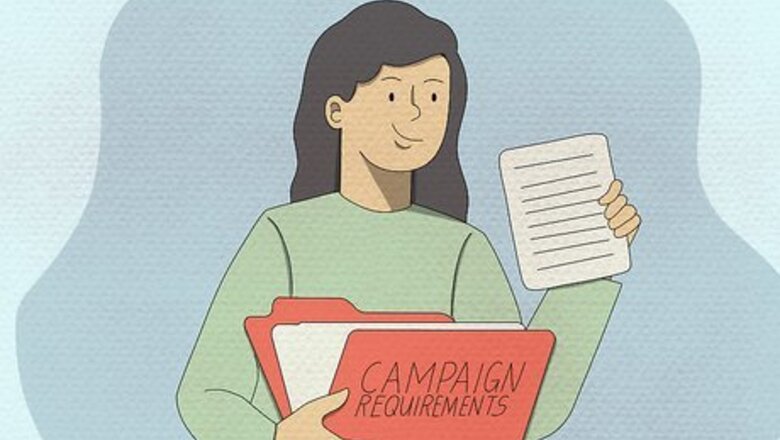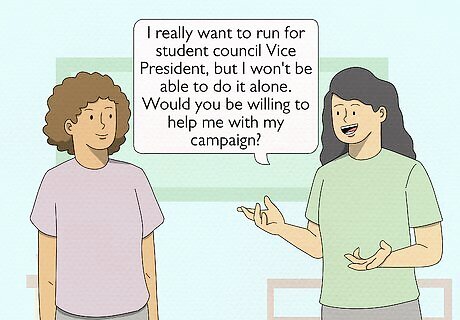
views
Planning Your Campaign

Check campaign requirements. Your school might require that student council candidates have a certain GPA or be in a certain grade. Make sure you check these requirements well ahead of launching your campaign. Start by checking in with the student council faculty advisor, who will know what these requirements are.

Think about why you want to run. Once you know you're eligible, spend some time thinking about why you'd make a good student council Vice President. Do you have a firm position about cafeteria food? The number of school dances every year? Thinking about this ahead of time will help you when it comes time to planning your campaign.

Find out what students want and need. Your campaign will be the most successful if you can demonstrate that it's focused on the same things your classmates care about. Promising free ice cream every Wednesday sounds like a good idea, but might not be a priority for the rest of your class. Put out a survey. A good way to find out what your classmates want is to give them a survey to fill out. You can make it open-ended, with questions like "What improvement do you most want to see in our school?" or more specific, by asking them to choose from a variety of options. Talk to other students. You can also speak to your classmates in person about what they want to see happen in your school. Try starting with your friends. You can say something like "I really want to run for student council Vice President, but to be a good one, I need to know what everyone wants from their VP. What do you want to see your VP do? What would you like to change about the school?"

Develop a platform. Use the information you get from your classmates to create a platform. This means deciding what you want to do as Vice President. Maybe your classmates worry about eating too much junk food. Part of your platform could be increasing the healthy options in the cafeteria. The more your platform corresponds to what your classmates have said, the better.

Make a plan for executing your platform. You need to have a plan to make your platform a reality or else your classmates will think you're just full of hot air! If your platform includes stocking the cafeteria with healthier foods, you might plan to meet with the school nurse to identify healthier options, and then with the principal to propose and implement these changes.

Come up with a campaign slogan. You can't share your platform and plans on one poster, which is why a campaign slogan is so important. It should reflect why you're running and what you believe in. Remember, it might be the only thing your classmates hear about you, so you want it to be good. Your campaign slogan can be funny or serious, but it should be simple. Something like "Jane Seymour for Vice President" will work. So will something like "The most interesting man in the world doesn't vote for student council often. But when he does, he votes for Jane!"

Find volunteers to help you. You can't make and hang posters, pass out flyers, and talk to other students all by yourself. Ask a few friends if they're willing to help you campaign! You can say something like "I really want to run for student council Vice President, but I won't be able to do it alone. Would you be willing to help me with my campaign?" Or you can ask for more specific help like "Would you be willing to help me hang my campaign posters?"
Campaigning

Spread the word. If you've put the effort into running for vice president, you don't want to just hope that someone will vote for you. There are a lot of ways to get the word out that you're running and why Make posters. Your posters can be as simple or as flashy as you like. It might help to see what others are doing and then do the opposite – if everyone is making bright, bold, flashy posters, make a simpler but still easily noticeable poster. If everyone else is going plain, go bright! This will help you stand out. Make a handout. Your classmates will be seeing a lot of posters during the campaign, so consider making a small handout to give to them, too. This should have your name, your slogan, and why you're running. But make sure your school allows these first – some schools only allow posters!

Write a winning speech. The most important part of your campaign will come when you're asked to give a speech in front of your class or school, describing why they should vote for you. There are a few tips for writing a winning speech that you should follow! Start by introducing yourself! You can say “Hi! My name is Jane and I'm running for Student Council Vice President!” Not everyone knows who you are, so introducing yourself is a good first step, and keeping it simple will help them remember you. Tell them why you're qualified to be Vice President. This is why thinking about these things ahead of time is helpful! You need to tell your class/school what will make you a good Vice President. You can say something like, “I'm a junior so I have experience knowing what the school needs” or “I've served as Student Council Secretary so I already know how it works!” Explain your platform and how you plan to execute it. This should be short and to the point: list the main thing you want to address and how you plan to address it. You can leave a lot of the detail to your handouts and conversations you have with your classmates. End with your slogan. Ending your speech with your slogan helps your classmates link the posters they see in the hallway to you and your plans.

Deliver your speech. When you give your speech, make sure you deliver it in such a way that makes it easy to follow and leaves an impression. Your speech shouldn't be too long - only 2 to 3 minutes at most. Short and sweet is best!
Surviving Election Day

Stay calm. It's a big day, but freaking out or having a meltdown won't inspire confidence in the classmates who are voting for you. Stay calm – don't yell at people to vote for you, don't question people about who they voted for, and don't panic and say nasty things about your opponents.

Dress appropriately. This bears repeating because it's as important when you give your speech as it is when people vote for you! Wear something nice to school on election day. A lot of people won't decide until the last minute who they're voting for, and seeing you already looking the part can change their minds! You don't have to wear something super formal, but you should at least look professional. Try wearing a jacket and some nice pants. Your hair should look neat. It might not be fair, but we all get judged by our appearance. If you look like you take your campaign seriously, other people will take you seriously, too.

Be friendly. Shake hands with people as they vote. Smile at them in the hallways. It's important to be kind to all types of students, not just the popular kids. People will vote for someone who is nice to them before they'll vote for the school bully.
Being Vice President

Follow up on the election. If you are elected, there are a few things you should do immediately after the election before you get to work as VP! Thank your volunteers. Make sure you say thank you to everyone who helped with your campaign. You can do this in person or you can write thank you notes. Or you can do both! Remove campaign material. Take down your posters and clean up any of your handouts that might still be lying around. This is especially important if your school has rules about when this needs to be accomplished. Congratulate your opponents. Whether you win or not, you should thank the people you ran against. This will help you maintain a good reputation if you decide to run again for another position or if you run for reelection in the same position. And it's also good manners!

Keep up with your responsibilities. The VP's responsibilities vary from school to school, but you will likely be responsible for running student council meetings in the President's absence. You might also be in charge of specific committees. Make sure you're going to all of the meetings and checking in with the President!

Speak up at meetings. You ran on specific promises to your classmates. You can ask to add items to student council meeting agendas that focus on the issues in your platform. You can also speak up during meetings to make sure your voice is heard on all issues.

Check in frequently. Don't ignore your classmates once you get elected! Check in with them regularly to make sure they're happy with what the student council, and you in particular, are doing. You can do this in face-to-face conversations by simply asking "What do you think of the job we're/I'm doing?" Or you can issue new surveys that ask the same thing.




















Comments
0 comment